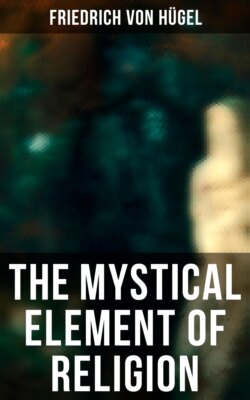Читать книгу The Mystical Element of Religion - Friedrich von Hügel - Страница 98
На сайте Литреса книга снята с продажи.
2. Three points to be noted here.
ОглавлениеHere I would note three things.
For one thing, there can be no serious doubt as to the authenticity of the saying that opens out this group of communications and as to the substantial accuracy of the two parallel, and (I think) mutually independent, reports as to her practice: since the saying belongs to the class of short declarations given in oratio directa, which we shall find to be remarkably reliable throughout the Vita; and the reports testify to something so unusual, so little sympathetic to the hagiographical mind, so much in keeping with the remainder of her doctrine and practice, that we cannot believe them misinformed. The author of the Dialogo evidently fully accepted these three passages, when, in about 1549, she paraphrases them thus: “She therefore made no account of her sins, with respect to their punishment, but only because she had acted against that Immense Goodness”; “She found herself to be her who alone had committed all the evil, and alone she wanted to make satisfaction, as far as ever she could, without the help of any other person.”[75]
For another thing, we have absolutely final contemporary documentary evidence of the importance attached by herself both to Indulgences, and the gaining of them (at least by other people), and to Masses and prayers for the Dead, inclusive of herself when she should be gone. For as to Indulgences, we have entries in the Cartulary of the Hospital (under the dates of March 11, April 10, May 29, and August 23, 1510) of various considerable sums, amounting in all to over £300, paid by the Hospital, at the first date, for Catherine’s nephew Francesco, at all the other dates for herself, for the withdrawal of a suspension of the Indulgences attached to the Hospital Church, and for the transference, in that year, of the day appointed for their acquisition. Both these matters were carried out in Rome by means of Catherine’s second nephew, Cardinal Giovanni Fiesco. This, it is true, is evidence that only covers the last six months of her life.
But as to Masses and Prayers for her own soul after death, we have (1) her second Will, of May 19, 1498, where she leaves one share in the Bank of St. George (£100) to the Observant Franciscans of the Hospital Church, “who shall be bound to celebrate Masses and Divine Offices for the soul of Testatrix”; (2) her Codicil, of January 5, 1503, where she leaves (in addition) £3 apiece to two Monasteries “for the celebration of Masses for her own soul”; (3) her third Will, of May 18, 1506, which confirms all this; and (4) her last Will, of March 18, 1509, where she leaves £3 each to three Monasteries, which are each to “celebrate thirty Masses for her soul,” £3 to a fourth Monastery for Prayers for her soul, and £25 to the Franciscans of the Hospital Church for the celebration of Masses to the same effect.[76]
The reader will at once perceive that these facts are fully compatible with the attitude so emphatically ascribed to her in the Vita, only if we take these latter statements as expressive of certain intense, emotional moods; or of some relatively short penitential period; or of what she did and felt with regard to herself alone and for whilst she was to live here below, not of what others should do for themselves at all times and for herself when she was gone.
And finally, we know exactly how and why the doctrine and practice described in those passages in the Vita were accepted by the Congregation of Rites, as forming no obstacle to her canonization. Pope Benedict XIV, in his great classical work on Beatification and Canonization, says, “After I had ceased to hold the office of Promoter of the Faith,” (the date will have been between 1728 and 1733,) “I know that a controversy arose as to the doctrine of a certain Beata, with regard to the truth of which it was possible to have different opinions.” And after giving this Beata’s doctrine and practice as these are presented by Catherine’s Vita, and citing the arguments used against their toleration, he proceeds: “But the Postulators answered (1) that this Beata had not omitted to gain Plenary Indulgences from any contempt for them, since her veneration for them was demonstrated by most unambiguous documents” (no doubt Cardinal Fiesco’s action, in her name and at her expense, in Rome in 1510, is meant); “(2) that it is the doctrine of very many theologians, that those do not sin, who do not labour to gain Indulgences because they desire to make satisfaction in their own persons in this world or to suffer in the next; (3) that we should not confound safety with perfection: it appears indeed to be safer to atone for one’s fault both by one’s own good works and by Indulgences; but not more perfect, supposing that a man abstains from Indulgences because his love of God and his detestation of having offended Him are so great that he desires to make satisfaction to Him, by bearing the whole of the merited punishment; and (4) that examples are not wanting of perfect souls, that have, for a while, desired to bear, even for the sins of others, the pains of Hell itself, although without falling away from the friendship and grace of God. And hence the Congregation of Sacred Rites considered that this doctrine did not militate against the holiness of the said Beata or against the approbation of her virtues as heroic.”[77]
